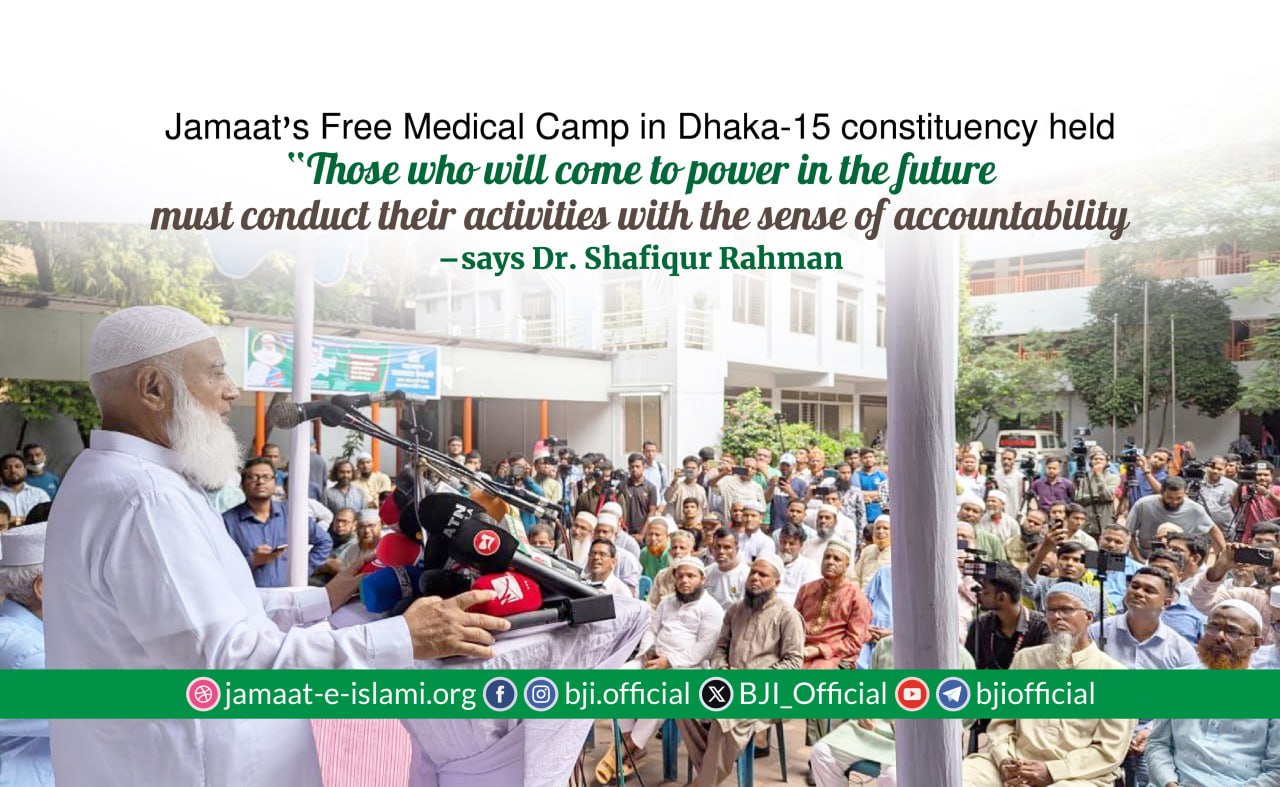Bangladesh Jamaat-e-Islami's Ameer Dr. Shafiqur Rahman has called upon the people not to hand over the key to state power to those who in the past embezzled the wealth of the nation and built mountains of personal fortune.
He made this call while addressing as the chief guest at a free medical camp organized by Dhaka-15 Constituency, Kafrul Thana South, held today at 10:30 a.m. at Monipur School and College, Ibrahimpur Branch-02, in the capital. Presided over by Thana Ameer Professor Anwarul Karim, the event was also addressed by Central Executive Committee Member and Nayeb-e-Ameer of Dhaka North City Abdur Rahman Musa, as special guest. Among others, Dhaka North City Working Committee Member Shahidullah, Shah Alam Tuhin, and others were present on the occasion.
Dr. Shafiqur Rahman said, “Based on the ideals of Jamaat-e-Islami, we have been continuing a long struggle to transform the country into a welfare state. Fundamentally, the welfare of the community and its liberation is the core objective of our politics. We are relentlessly making efforts to replace the negative culture of politics with a positive one in this country. We wish to gift the nation such a society where the rights of all people—regardless of religion, race, or ethnicity—will be ensured. The state will not discriminate against anyone in any way. The country will be free from corruption, misrule, and tyranny. Our two ministers in the past have already proven our capability to keep promises: they were free from corruption, honest, competent, and highly efficient. Therefore, to establish the desired society, the Islamic force must be sent to power in the future.” He urged all to remain prepared to make any sacrifice for the establishment of Deen Islam.
He further said, “Through the July Revolution, immense possibilities have opened before us. But the risks have not fully disappeared. Hence, we must proceed with utmost caution.” Highlighting the importance of upholding values in politics, the Jamaat Ameer stated, “Those who will come to power in the future or who aspire to power must carry out all their tasks with accountability to conscience and being fearful to Allah. For, while one may deceive everyone else, it is never possible to deceive Allah. We want to build a new Bangladesh of justice, where all people—irrespective of religion, race, ethnicity, gender—will live free from fear and anxiety. Those who ruled in the past failed to provide a fearless environment to the people. Therefore, considering the future, we must make conscious and informed decisions for tomorrow’s Bangladesh.
If the people give their verdict in favor of truth, then within just five years it will be possible to free the country from hunger and poverty and bring about positive transformation.” He called upon everyone to remain united to realize this dream.
He also added, “To restore public confidence in domestic healthcare and to help physicians regain faith in themselves, I made the decision to undergo treatment in the country. In reality, health and sickness are in the hands of Allah. We have seen many people return in coffins after seeking treatment abroad, while many others have fully recovered through treatment inside the country. If Allah wills, He can grant health anywhere, through the means of physicians. Physicians are merely the medium—ultimately, it is Allah Who grants good health. Therefore, to revive confidence in domestic healthcare, I myself received treatment in the country. This will inspire local physicians as well. For ordinary people, expensive treatment abroad is simply not possible.”
The Jamaat Ameer said, “Healthcare is a noble and service-oriented profession. Therefore, physicians must treat people from all walks of life with a spirit of service. To improve the quality of healthcare in the country, medical education must be made globally standard, and local hospitals must be enriched with modern medical equipment. At the same time, treatment centers must ensure patient-friendly services. To restore public trust in domestic healthcare, medical services must be made accessible and improved. Only then will people regain confidence in domestic treatment.”
